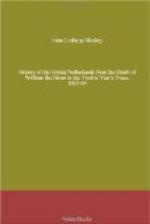There was indeed a new sovereign upon the throne. That most regal spirit which had well expressed so many of the highest characteristics of the nation had fled. Mankind, has long been familiar with the dark, closing hours of the illustrious reign. The great queen, moody, despairing, dying, wrapt in profoundest thought, with eyes fixed upon the ground or already gazing into infinity, was besought by the counsellors around her to name the man to whom she chose that the crown should devolve.
“Not to a Rough,” said Elizabeth, sententiously and grimly.
When the King of France was named, she shook her head. When Philip III. was suggested, she made a still more significant sign of dissent. When the King of Scots was mentioned, she nodded her approval, and again relapsed into silent meditation.
She died, and James was King of Great Britain and Ireland. Cecil had become his prime minister long before the queen’s eyes were closed. The hard-featured, rickety, fidgety, shambling, learned, most preposterous Scotchman hastened to take possession of the throne. Never—could there have been a more unfit place or unfit hour for such a man.
England, although so small in dimensions, so meager in population, so deficient, compared to the leading nations of Europe, in material and financial strength, had already her great future swelling in her heart. Intellectually and morally she was taking the lead among the nations. Even at that day she had produced much which neither she herself nor any other nation seemed destined to surpass.
Yet this most redoubtable folk only numbered about three millions, one-tenth of them inhabiting London. With the Scots and Irish added they amounted to less than five millions of souls, hardly a third as many as the homogeneous and martial people of that dangerous neighbour France.
Ireland was always rebellious; a mere conquered province, hating her tyrant England’s laws, religion, and people; loving Spain, and believing herself closely allied by blood as well as sympathy to that most Catholic land.
Scotland, on the accession of James, hastened to take possession of England. Never in history had two races detested each other more fervently. The leeches and locusts of the north, as they were universally designated in England, would soon have been swept forth from the country, or have left it of their own accord, had not the king employed all that he had of royal authority or of eloquent persuasion to retain them on the soil. Of union, save the personal union of the sceptre, there was no thought. As in Ireland there was hatred to England and adoration for Spain; so in Scotland, France was beloved quite as much as England was abhorred. Who could have foretold, or even hoped, that atoms so mutually repulsive would ever have coalesced into a sympathetic and indissoluble whole?
Even the virtues of James were his worst enemies. As generous as the day, he gave away with reckless profusion anything and everything that he could lay his hands upon. It was soon to appear that the great queen’s most unlovely characteristic, her avarice; was a more blessed quality to the nation she ruled than the ridiculous prodigality of James.




